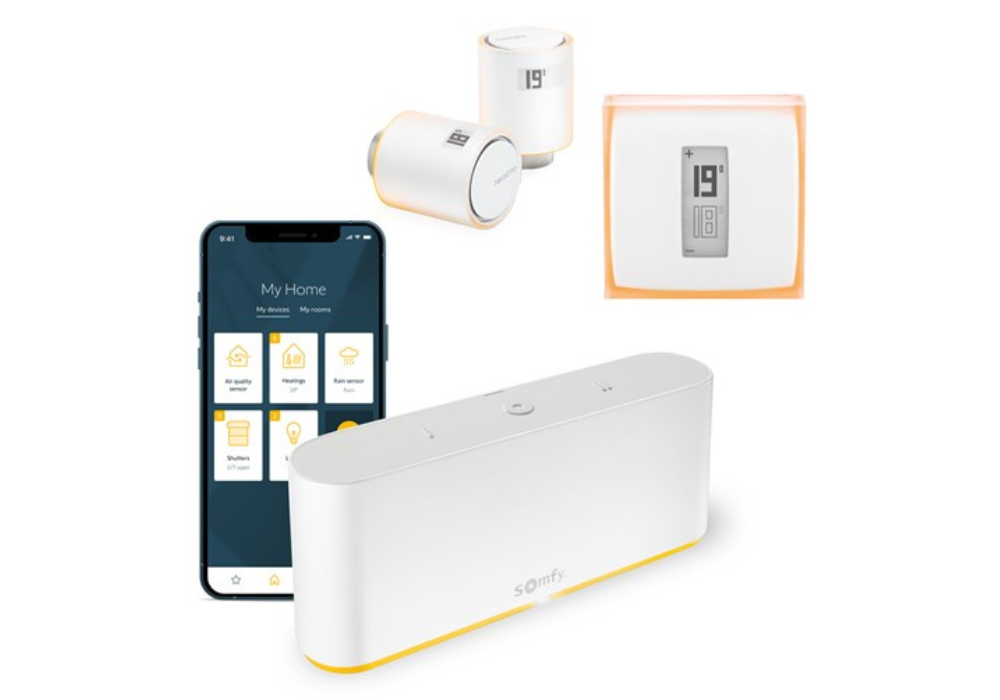
Netatmo utökar samarbete med Somfy

Installing effective fire safety equipment is a vital step to ensuring adequate safety levels in your home. This might include alarms, smoke detectors, or any other fire prevention or protection equipment.
But, accurate information and training is also vital for fire prevention and protection. Even if you’ve got all the latest high-tech safety equipment, you still need to know how to use it and how to respond in the event of a potentially dangerous situation.
So, first thing’s first. Netatmo has put together some basic safety measures to take into account when you’re browsing fire safety equipment, as well as prevention and protection systems for your home, or any other building:
Did you know that smoke detectors are specifically designed to detect toxic fumes, for example carbon monoxide, and non-toxic fumes, such as water vapour? Smoke detectors are vital home safety equipment, both for detecting potential fires within the building and picking up on any other potentially dangerous fumes.
In large buildings other than your home – for example, commercial locations and large office blocks – you’ll be used to seeing emergency information that outlines “in the event of emergency” instructions and designates evacuation and emergency assembly points. It’s wise to organise similar systems for your home, so its inhabitants know how to get out if there’s an issue and also where they should reassemble.
The latest smoke detection and fire prevention equipment often features functions that allow direct, automatic communication with the emergency services in the event of a problem. Choose this latest high-tech equipment for your home and you’ll be able to dial your home safety up a notch.
If you’re looking to install Level 2 Fire Alarm Systems, the fire prevention equipment involved will specifically target high-risk areas within the building. While Level 2 Fire Alarm Systems are perhaps more relevant to large residential complexes, it’s worth bearing in mind the usefulness of installing fire safety and prevention equipment close to areas that pose a greater risk, such as the boiler room.
In the UK, there are legal requirements regarding the installation of alarm systems within homes and other types of buildings. Whether it’s a private residential, corporate or commercial building in question, you’ll need to ensure that you comply with the legislation in force in order to reduce the risk of fire and help make prevention and protection a real priority. Make sure you check your smoke detectors regularly and provide updated information on how to maintain and operate them.
Ensure that any high fire-risk equipment that you many have in the home (complex wiring for electrical devices, for example) is as safe as possible. Turn off appliances properly when they’re not required, especially overnight and when you’re away from the home. Of course, basic fire safety rules apply: for example, make sure that you’re extra careful when using candles and hearth fires in the home.
A fire safety evacuation plan can help reduce the risk a potential emergency will pose to the people in your home. Make sure everyone in the home knows how to quickly and easily leave the property in the event of a fire. Fire evacuation plans are vital both at home and at work. These need to be clear and well rehearsed, so that people can quickly find their way out of the building, even if their vision is obscured by smoke.
Make sure everyone in the home knows this basic fire safety information, as well as where they can find fire safety equipment within the home. If it’s a non-residential building in question, make sure there are adequate fire safety training systems in place to share the relevant prevention, protection and use of equipment information with employees.
Fire extinguishers are vital components of fire safety equipment. Fire alarms and smoke detectors can alert you to the need to evacuate the home, but fire extinguishers – or fire blankets – are equipment you can use to effectively fight any fires in your home. Of course, make sure you do not do this at too great a risk to your own personal safety.
Fire prevention measure no.6: increase fire safety equipment around high-risk areas
As we’ve seen, Level 2 Fire Alarm Systems will concentrate the prevention and protection measures around areas at greater risk of fire. Ensure that these zones also contain the appropriate information regarding the fire safety equipment that’s available, as well as how to make use of alarm systems.
Ensure that these fire prevention measures feature in any fire safety training courses that you might be organising for your building.
Netatmo’s Smart Smoke Detector regulates its own accurate function. What’s more, you’ll be able to test, control and monitor your Netatmo Smart Smoke Detector remotely from your mobile phone. Reduce the risk of fire in your home – or any other building – with effective fire safety equipment!